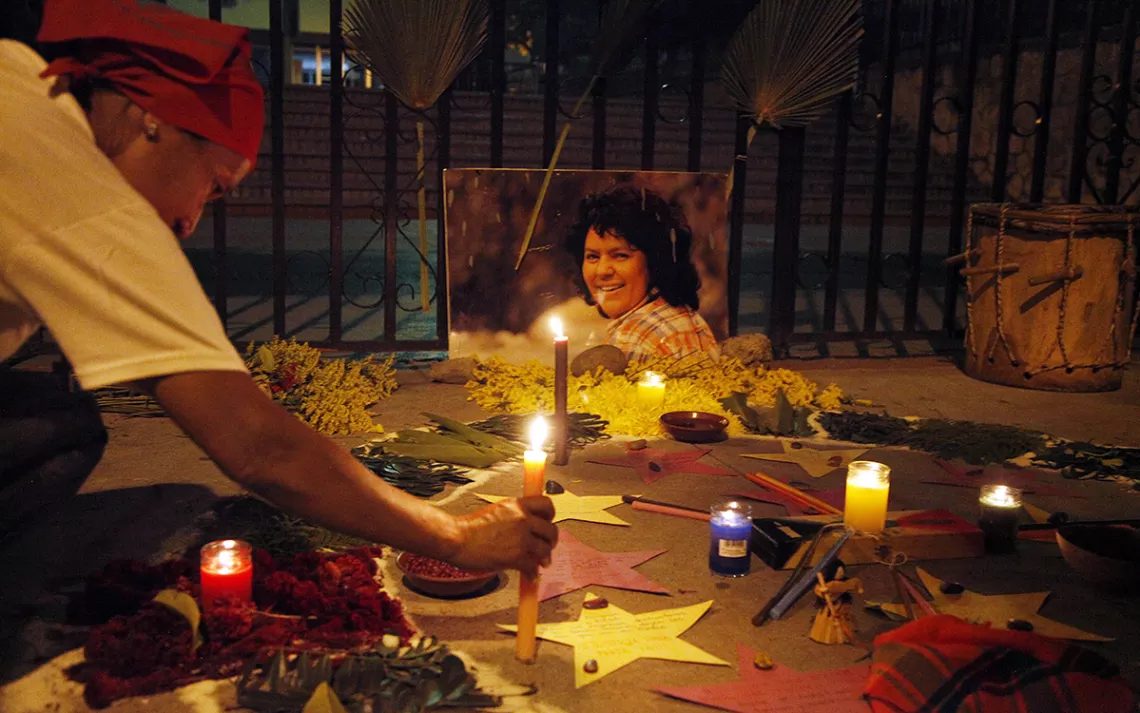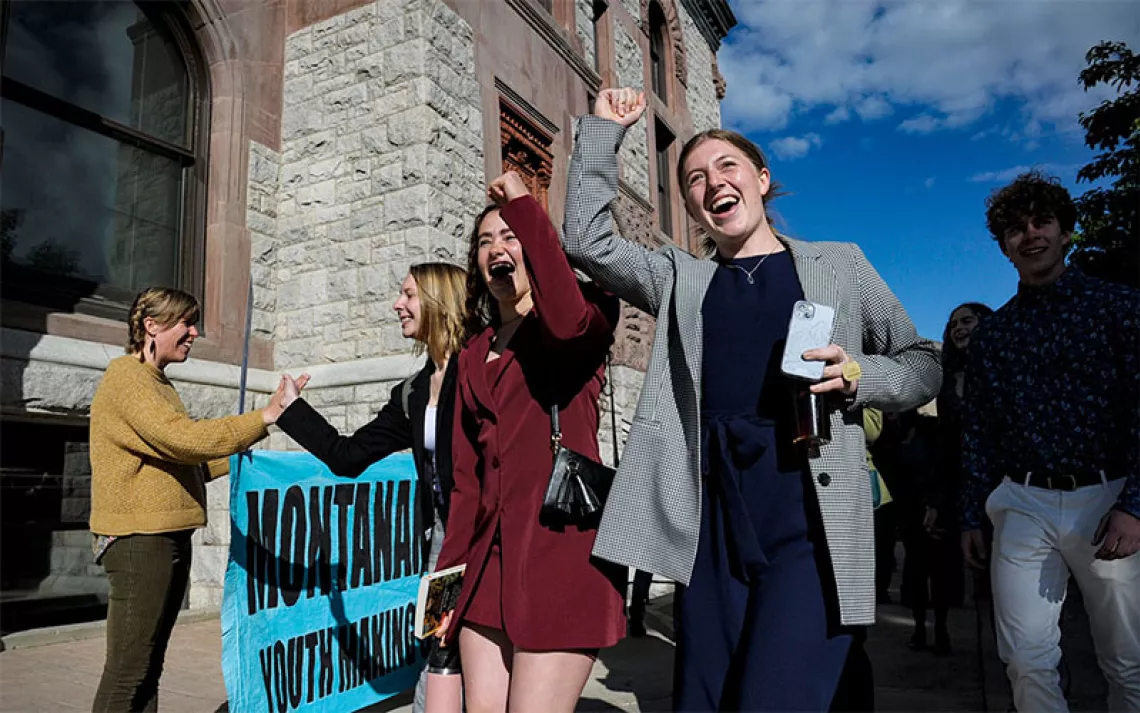Justice Is (Partially) Served in Berta Cáceres Murder Trial
Seven convicted, one acquitted for assassination of Honduran activist

A woman places a candle in front of a picture of Berta Cáceres. | Photo by AP Photo/Fernando Antonio
On Thursday, November 29, a Honduran court convicted seven men for the murder of Berta Cáceres, the world-renowned environmentalist, feminist, and Indigenous leader who was killed in her home in La Esperanza, Honduras, on March 2, 2016.
After spending her entire adult life engaged in the struggle for social change, Cáceres came to international fame when she helped coordinate Indigenous resistance to the proposed Agua Zarca dam on the Gualcarque River, located in the territory of the Lenca people. In the course of her campaigning, Cáceres received repeated harassment and death threats from Honduran soldiers and managers and executives of the dam’s construction company, Desarrollos Energéticos S. A., or DESA. Cáceres received the Goldman Environmental Prize in 2015 for her work defending the river. She was assassinated on the eve of her 44th birthday.
The seven men convicted for Cáceres’s murder are military officer Major Mariano Díaz Chávez; Agua Zarca manager, Sergio Ramón Rodríguez; Douglas Geovanny Bustillo, an ex-military man who was DESA's chief of security between 2013 and 2015; a former soldier, Henry Javier Hernández Rodríguez; and three civilians with no known connections to DESA or the army, Edilson Atilio Duarte Meza, Óscar Aroldo Torres Velásquez, and Elvin Heriberto Rápalo Orellana.
Emerson Eusebio Duarte Meza, Edilson's brother, was acquitted on all charges.
The court also convicted four men for the attempted murder of Mexican activist Gustavo Castro, who was staying at Cáceres’s home on the night of the killing. Castro was shot at close range, and a bullet removed the top of his ear and caused significant bleeding, which lead the gunman to believe he had shot Castro in the head. Castro survived by pretending to be dead and was the sole witness to Cáceres’s murder.
Independent investigators identified Rápalo Orellana as the gunman who killed Cáceres and Torres Velásquez as the gunman who shot Castro. Both men, as well as Edilson Duarte Meza and Hernández Rodríguez, were also convicted of attempted murder.
The court will announce the sentences for the seven men convicted of Cáceres’s murder and the four men convicted of the attempted murder of Castro on January 10.
While celebrating the convictions, Cáceres’s family, Castro, and human rights organizations denounced the court’s failure to investigate and prosecute all those involved in ordering, planning, and financing Cáceres’s murder.
“The court’s decision in this trial will not silence the demand for complete justice for the compañera Berta Cáceres. Those with the highest level of responsibility for this vile act are not on trial here,” said Berta Zúñiga, Cáceres’s daughter and the general coordinator of the Civic Council of Popular and Indigenous Organizations of Honduras (COPINH), the organization founded by Cáceres and her then partner, Salvador Zúñiga, in the early 1990s.
“The convictions of the accused represent a major achievement, thanks to the international pressure and despite the illegality of the trial, conducted with insufficient evidence, without the necessary witness testimonies, and without complete forensic studies,” Castro wrote in an email. “The material authors have been convicted, but not the intellectual authors—those who planned and paid for the murder, which seems to be the company [DESA] and its owners in the Atala family. There are convictions but no justice.”
COPINH released a statement after the court announced the convictions, stating that the court “condemns the hired killers and the intermediate planners directly related to DESA” but fails to investigate and prosecute “the structures and people who paid for the criminals to murder Berta Cáceres and who continue to enjoy their freedom and carry out similar crimes with impunity.” COPINH claims that the Atala Zablah family, DESA shareholders, “is behind the entire campaign of persecution, harassment, attacks, threats that all led to the murder of Berta Cáceres.”
Amnesty International described the convictions as “half-truths” in a press release.
The Honduran police initially tried to incriminate members of Cáceres’s organization, an ex-romantic partner, and even Castro in the murder. But political pressure—both from within Honduras and internationally—forced the police to abandon such tactics and investigate DESA employees and military personnel.
Last March, Honduran police arrested David Castillo, a former military intelligence officer and the president of DESA, at the San Pedro Sula airport, exactly two years to the day after Cáceres’s murder. Castillo is the only alleged intellectual author of the assassination who is currently facing charges.
The Cáceres family, Castro, and international observers have complained about irregularities in the murder investigation and the prosecutors’ case. The prosecution did not include any forensic analysis of fingerprints and bloody footprints left in the Cáceres home, nor did it include in its arguments a pistol found in Mayor Díaz’s home and submitted for ballistic analysis, though the firearm matched the caliber of the murder weapon. Neither did the prosecution call on DESA top executives or military commanders to testify. Rather, the prosecution relied heavily on cellphone records to make its case.
“Despite the ruling delivered in this emblematic case, the Honduran justice system must demonstrate its commitment to the truth and identify all those who planned and ordered the murder of Berta Cáceres,” said Erika Guevara-Rosas, Americas director at Amnesty International.
The Cáceres family and Castro have also denounced a series of legal maneuvers carried out by prosecutors to exclude them from reviewing the case file or contributing information to the investigation, both rights guaranteed to victims in Honduran law.
In an op-ed published on November 28 in the Spanish newspaper El País, Berta Zúñiga denounced the way in which she and her family were excluded from the case:
“Two and a half years after my mom’s death: What could I say to her now? That I have done everything I could, but now that I have been expelled from the trial I will not have a voice to say that her death came after a period of terror imposed by those who followed her, and the person who infiltrated her organization; that I won’t be able to try to silence the lies that in the trial attempt to transform victims into perpetrators.”
In the week prior to the conviction, an international law firm representing DESA, Amsterdam and Partners LLP, released a report titled “War on Development,” seeking to exonerate the corporation’s leadership. The report is supposedly based on purported text messages from Cáceres’s cellphone showing that Cáceres and DESA had established a cordial relationship before her murder. The court did not allow these messages to be admitted as evidence in the trial. The report blames COPINH’s opposition to the Agua Zarca dam for the migration crisis in Honduras and describes the DESA employees convicted and still awaiting trial as “political prisoners.”
Honduran activists such as the Honduran Black Fraternal Organization denounced the report as a continuation of the smear campaigns that targeted Cáceres and COPINH before her murder.
While the Cáceres murder convictions represent a measure of accountability, political violence and impunity remain entrenched in Honduras. The same day that the court announced the convictions, Reynaldo Reyes Moreno, a community leader in the southern Honduran municipality of Namasigüe, was gunned down while riding his motorcycle.
 The Magazine of The Sierra Club
The Magazine of The Sierra Club



